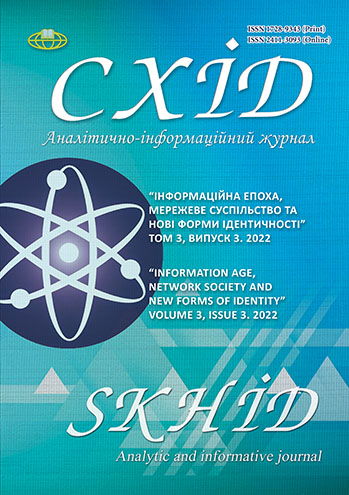Why should Ukraine be a fast state for overcoming war consequences?
DOI:
https://doi.org/10.21847/1728-9343.2022.3(3).266361Keywords:
Ukraine, war, economic development, fast economy, international politics, innovations, international geopolitics, military economy, compensationsAbstract
A full-scale invasion of Ukraine became a challenge not only for it, but also for the whole world, which has not yet overcome the consequences of the covid pandemic. Rethinking approaches to assessing the impact of military actions on the economy requires the development of new theoretical foundations and practical recommendations. Previous experience cannot be used, including as a result of changes due to globalization processes.
The modern world is characterized by openness and interdependence at all levels - from economic to social. That is why blocking ports in Ukraine can cause famine in African countries. The influence of civil society affects the economic behavior of international corporations, which are forced to leave the market of the Russian Federation not only because of sanctions, but also to preserve the image and loyalty of consumers. The creation of a single European space currently also requires the formation of a single line of behavior in relation to Ukraine and Russia. This is far from a complete list of the latest relationships that shape the modern world and affect the economy.
Currently, Ukraine suffers losses every day, the amount of which cannot be fully estimated. This is hindered by the incompleteness of information, the continuation of hostilities, and the inconsistency of existing methods with the current situation.
In the article, based on the analysis of the existing situation and existing challenges, the concept of a fast state is proposed. The idea grounds the socio-economic state's development on the maximum promotion of entrepreneurial activity. It is based on a synergistic effect when the introduction of business opportunities will stimulate the creation of new workplaces, the growth of incomes, and with them, the expenses of the population, which in turn will boost the opening of new enterprises and the development of existing ones. The central, new idea of a fast state is to concentrate not on raising taxes but on reducing them as much as possible and filling the budget due to the growth of entrepreneurial activity, and not on increasing levies on those that are still functioning. Also, the research makes the point that the reconstruction of the state in the context of a fast state will be built based on finding one's own innovative trajectory of development and not on the adaptation of best practices focused on the catch-up nature of such action.
Downloads
References
Buriak, Glib, Natalukha, Dmytro, Davydov, Vladyslav (2022). Run twice as fast to keep up. Why should Ukraine be a fast state https://biz.nv.ua/ukr/experts/-yak-ukrajini-vistoyati-ekonoichno-shcho-take-shvidka-derzhava-i-yak-vona-pracyuye-ostanni-novini-50260970.html
Economic consequences of the COVID-19 pandemic (2020). Copenhageneconomics.com. https://co-penhageneconomics.com/wp-content/uploads/-2021/¬12/copenhagen-economics_economic-consequences-covid-19.pdf
Felberg, Rob (2022). Globalization 4.0. CoreSite. https://www.coresite.com/blog/globalization-4
Frankel, Joseph (2022). Social theories. Encyclopedia Britannica https://www.britannica.com/topic/war/-Social-theories
Gartner (2016) Hype Cycle for Emerging Technologies Identifies Three Key Trends That Organizations Must Track to Gain Competitive Advantage https://www.-gartner.com/en/newsroom/press-releases/2016-08-16-gartners-2016-hype-cycle-for-emerging-technolo-gies-identifies-three-key-trends-that-organizations-must-track-to-gain-competitive-advantage
Globalization 4.0 – what does it mean? (2019) World Economic Forum https://www.weforum.org/agenda-/2018/11/globalization-4-what-does-it-mean-how-it-will-benefit-everyone
Gopinath, Gita (2019). Pros and Cons of Globalization. The European Sting. https://europeansting.com/2019/¬04/12/an-economist-explains-the-pros-and-cons-of-globalization/
Grasso, A. & Grasso, L. (2019). Ruolo ed impatto sull’economia delle tecnologie emergenti nel paradigma della globalizzazione 4.0. Economistas (Coligio de Madrid). # 165, 129-136. https://privado.-cemad.es//revistas/online/Revistas/Economistas-165.pdf/170 (Spanisch)
Krausmann, F., Gingrich, S., Eisenmenger, N., Erb, K. H., Haberl, H., & Fischer-Kowalski, M. (2009). Growth in global materials use, GDP and population during the 20th century. Ecological economics, 68(10), 2696-2705.
MIND (2022) To restore everything: what you should know about the "Marshall Plan" for Ukraine https://mind.ua/en/publications/20244464-to-restore-everything-what-you-should-know-about-the-marshall-plan-for-ukraine
National Bank of Ukraine (2022, June 21). Financial System Withstands Wartime Challenges – Financial Stability Report. https://bank.gov.ua/ua/news/-all/finansova-sistema-uspishno-protistoyit-viklikam-viyni - zvit-pro-finansovu-stabilnist
Tsyrennikov V. (2022, April 6) A trillion-dollar question: What Russia owes Ukraine VoxEU – https://cepr.org/voxeu/columns/trillion-dollar-question-what-russia-owes-ukraine
Thangave, P. et al. (2021) Covid-19: Globalization – Will the Course Change? The Journal of Business Per-spective Volume: 26 issue: 1, page(s): 7-10 https://doi.org/10.1177/0972262920984571
Thies, Clifford F. and Bau, Christopher F. (2020). The Effect of War on Economic Growth. Cato Journal, 40 (1) https://doi.org/10.36009/CJ40.1.10
Ülgen, Sinan et al. (2022). From the Local to the Global: The Politics of Globalization. Carnegie Europe. https://clck.ru/32S6id
United Nations (2021). COVID-19 to slash global eco-nomic output by $8.5 trillion over next two years. Departament of Economic and Social Affairs. https://www.un.org/en/desa/covid-19-slash-global-economic-output-85-trillion-over-next-two-years
Vanham, Peter (2019). A brief history of globalization. World Economic Forum. https://www.weforum.org/-agenda/2019/01/how-globalization-4-0-fits-into-the-history-of-globalization/
Watson, M. F., Bacigalupe, G., Daneshpour, M., Han, W. J., & Parra‐Cardona, R. (2020). COVID‐19 intercon-nectedness: Health inequity, the climate crisis, and collective trauma. Family process, 59(3), 832-846.
Zhalilo, Yaroslav (2022). Yak shvydko "perezapustyty" ekonomiku u voyennykh umovakh. Ekonomichna pravda. https://www.epravda.com.ua/columns/2022/-03/17/684234/ (In Ukrainian)
Downloads
Published
How to Cite
Issue
Section
License
Copyright (c) 2022 Любов Жарова

This work is licensed under a Creative Commons Attribution-NonCommercial-NoDerivatives 4.0 International License.
1. Authors bear responsibility for the accuracy of facts, quotations, numbers and names used.
2. Manuscripts are not sent back.
3. The publisher does not always agree with the authors' opinion.
4. The authors reserve the right to authorship of the work and pass the first publication right of this work to the journal under the terms of a Creative Commons Attribution-NonCommercial-NoDerivatives 4.0 International License. This license allows others to distribute (copy) the published work for non-commercial purposes, provided there is mandatory attribution to its authors and a link to the first publication in our journal.
5. The authors have the right to conclude separate supplement agreements that relate to non-exclusive work distribution in the form in which it has been published by the journal (for example, to upload the work to the online storage of the journal or publish it as part of a monograph), provided that the reference to the first publication of the work in this journal is included.

